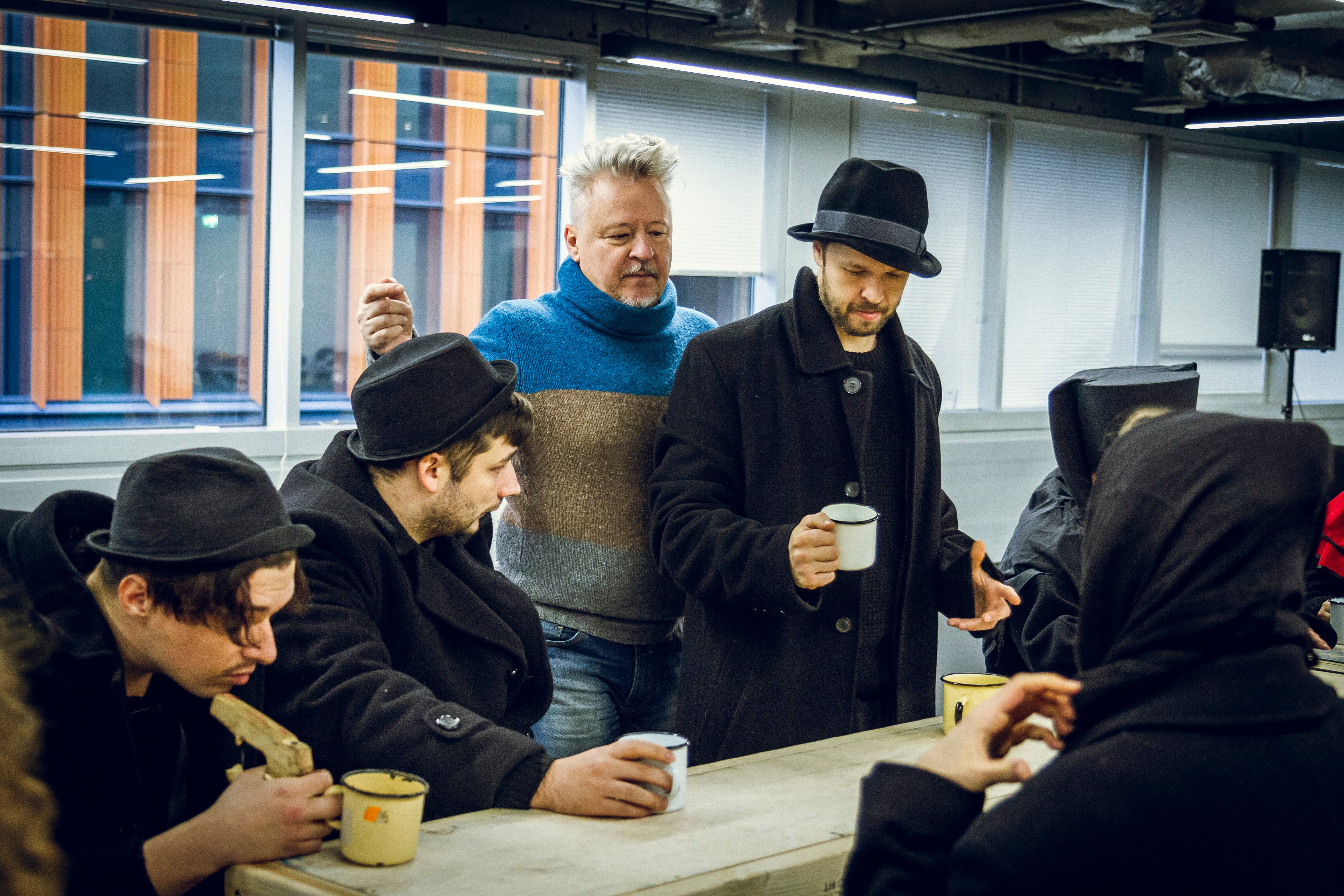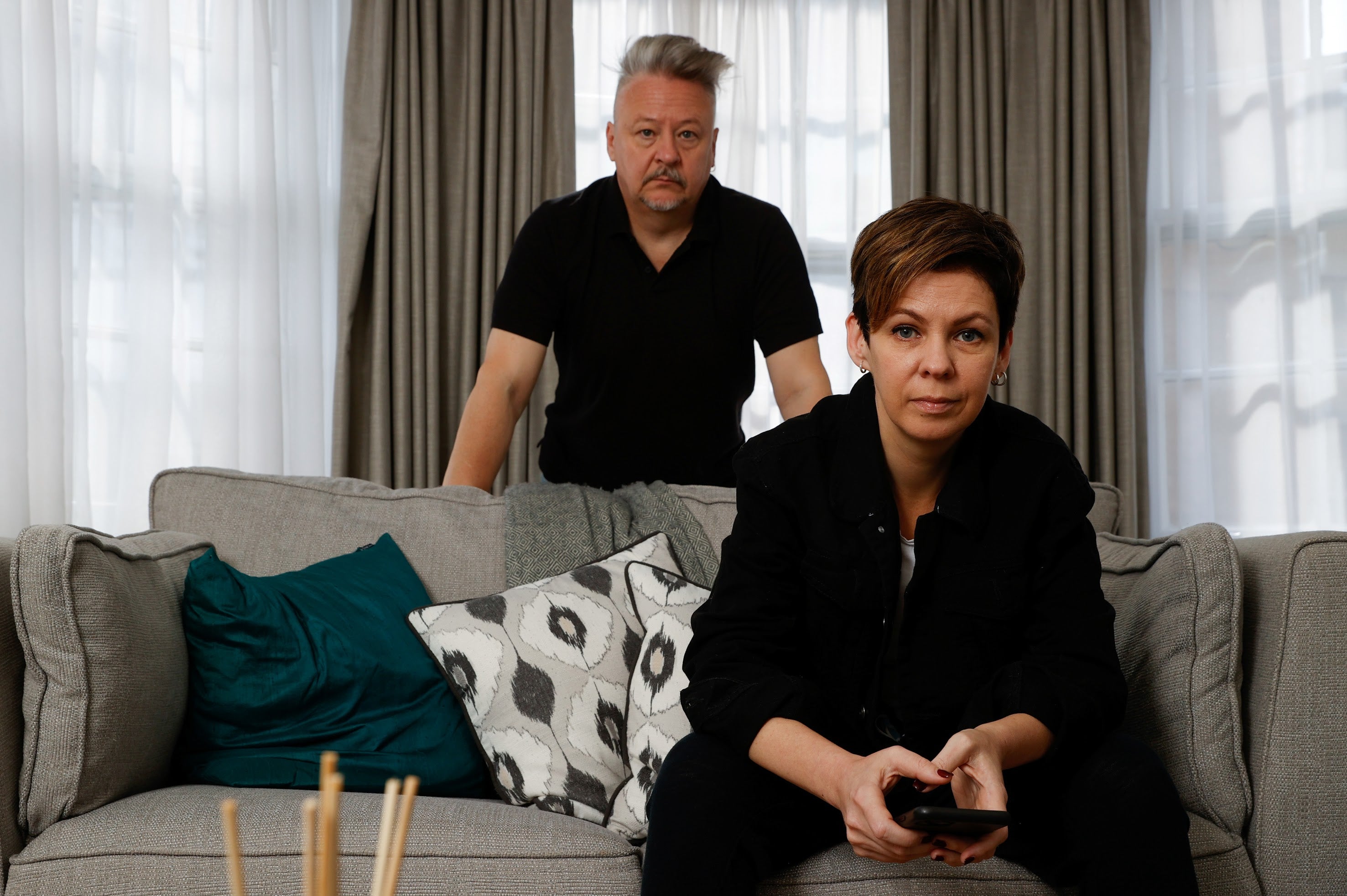‘I was not ready to be killed’: The secret theatre forced into exile by the KGB
Belarus Free Theatre created art in secret under the dictatorship of Alexander Lukashenko but went into exile after their latest encounter with the Belarusian KGB. They talk to Jasper Rees about the threat to artists in their country and the dystopian ‘Dogs of Europe’

In August 2020, a leading figure of Belarus Free Theatre, the renowned company based in Minsk, found herself in a choke hold. “A policewoman put me on my knees and choked me with [the crook of] her elbow,” says Svetlana Sugako. “I said, ‘Now you will kill me and you will live with that for the rest of your life.’ She was very angry because I had to sign a protocol [with falsified details] of my arrest and I said, ‘I will not sign it because it’s not true.’”
Sugako and her partner Nadia Brodskaya, the administrative figureheads of Belarus Free Theatre who are both in their early thirties, were detained on the evening of the election on 9 August. There was much optimism that, after 26 years, President Alexander Lukashenko would finally be voted out of office. Because his despotic government had shut down the internet, Sugako and Brodskaya were waiting for the results at a polling station in the capital’s largest public space when a policeman approached and ordered them into a van.
They were taken to Okrestina, the Belarusian KGB’s infamous prison in the heart of Minsk. After being forced to stand with many others in a corridor for hours, they were separated and locked up. “It was a horrible night of screaming and shouting,” Sugako recalls. The next day she was one of 36 women crammed into a cell designed to hold four people.
“There was a toilet inside, a hole with a door. And all the smell. Because a lot of people were very stressed your body your stomach reacts and there’s nothing you can do. We spent three days there with no water or food. It was very warm and the window could only open ten centimetres. I thought, that’s it, I’m done – you couldn’t breathe.”
It’s only when I ask her about her release after five days that Sugako begins to cry. “They took us from that bench and released us into a completely different country. We made a quantum leap. You had this feeling, he [Lukashenko] couldn’t survive into the next year. Now after a year and a half he still has power and we were wrong.”
Belarus Free Theatre is making a delayed return to the UK, where several of its previous productions have been hailed. Dogs of Europe, due to run for three nights at the Barbican, was originally scheduled for May 2020 until the pandemic intervened. In the intervening period, everything has changed.
On a wider scale there is the Russian invasion of Ukraine, using forces partly deployed in Belarus, and Sunday’s referendum result altering the constitution, which will enable Belarus to drop its non-nuclear status and thus allow Russian nuclear warheads onto its territory. Only a day later, a video emerged of a Belarusian convoy massing on the Ukrainian border. But for Belarus Free Theatre, there has already been a change in circumstances: in the autumn of last year the entire company made the momentous choice to go into exile.

“It was not an overnight decision to leave,” says Natalia Kaliada, who founded the company with her husband Nikolai Khalezin in 2005. “We had been discussing relocation for the 12 years. We spoke a number of times with the actors: ‘should we get all of you out of Belarus?’”
It was the election which finally changed minds. When I visited Minsk in September 2017, the canvas on which the company operated looked very different. Whereas for much of its history it had performed in secret in private apartments, for two years Belarus Free Theatre had made its home in a converted garage. Shows were announced via VK, the Russian social media site, and Brodskaya took bookings over her phone. First-timers were told to muster in front of a nearby supermarket where they were collected and escorted to the theatre.
I attended three very different productions on three consecutive evenings. There was no attempt to impede these performances. Company members faced arrest only when they protested about disability rights and LGBT+ equality as part of public campaigns they labelled “artivism”. A status quo that enabled the company to work at home and abroad hinged on a Kafkaesque rationale. “Officially we don’t exist here,” Sugako explained at the time. “That means they couldn’t close us because we’re not open. You can’t close something that’s not open.”
Even the pandemic did not initially affect the company’s work. They were used to operating online. To avoid imprisonment its founders had been forced into exile in the UK in 2010, and Khalezin directed every production and introduced every performance from London via Skype. But after the elections, despite every effort to protect email links for livestream shows with passwords, the company’s digital footprint was making it more vulnerable to state surveillance.
Alexei Saprykin, who spent 15 days in prison in December 2020 after taking part in one of the post-election protests, decided to seek exile after seeing his name publicly mentioned as a person of interest. “It was quite a complicated decision to leave,” he says. “Every day we woke up and read the news about people who had been raided by police – journalists, musicians, actors, civic activists. I understood that there would be a time when we could get the ‘knock knock, who’s there’ from the police.”
Among the many egregious attacks on freedom of speech was the prison sentence of 11 years handed down in September 2021 to the flautist and leading political activist Maria Kalesnikava, more than a year after her initial arrest. The following month the entire company of Belarus Free Theatre, some with family members, was smuggled out through secret channels.
Largely funded by two anonymous donors, one British, the other American, they spent a month in Ukraine. Kaliada and Khalezin organised for them to have trauma therapy from a specialist who had helped soldiers with PTSD after serving in eastern Ukraine. The company moved on to Poland, where they started to work with child refugees from Belarus. The plan was to return there after the Barbican run and to continue that work with Ukrainian children. But, explains Kaliada, “as there are millions of refugees who are coming to Poland from Ukraine, there is no chance to go back and they need to stay in the UK”. With no funds of their own, the company has launched a donation page to help pay their way and, in Kaliada’s words, “to continue their urgent role as a front-line cultural resistance movement”.

Rehearsals for Dogs of Europe were held at Three Mills Island, the network of studio spaces in east London. I happened to go along on Thursday 24 February, the day Russia invaded Ukraine. Several of the company’s collaborators – two composers, the co-executive director, the video animator – have family in Ukraine. The mood was sombre. In the cavernous rehearsal space, against a vast projected image of Belarusian countryside, a couple of actors performed. Those not rehearsing sat in corners scrolling their phones.
When I met her four and a half years earlier, no one was more effervescent than Marina Yakubovitch, a bubbly woman with a short blonde crop who has come into exile with her husband and young son. “All this morning I was thinking about how I can rehearse and perform the show during a war,” she says. “And how can the audience come to see the show during the war? And I gave myself an answer: that this is my job.”
Dogs of Europe is adapted from a banned dystopian novel by the Belarusian writer Alhierd Baharevic, who left the country in the spring of 2020 for work, but has not returned. Like most shows in the company’s history, it will comment obliquely on life in what in the 1990s began to be described, before the rise of Putin, as Europe’s last dictatorship. “We have to understand why we were doing this show,” says Kaliada. “Everything that was seen as dystopian in the book set in 2049 is happening now in reality. We are allowed to be angry, but we must convert that anger into the best possible theatre in order to shake all the politicians who will attend the show.” The plan is to invite Liz Truss, though whether she will accept the photo opportunity remains to be seen.
The past weeks have given the world a rapid education in the geopolitics of Eastern Europe. The plight of Belarus risks being lost in the avalanche of news about Ukraine. It would help the cause if a wider audience could be found for Courage, an inspirational feature-length fly-on-the-wall documentary about the 2020 election protests focusing on members of Belarus Free Theatre, including Marina Yakubovitch.
In the meantime, the company is working on a show provisionally titled Gloomy Sunday, based on their own experience of jail. The irony that it can be created and performed only outside Belarus is not lost on Svetlana Sugako.
“There was a time when I couldn’t talk about leaving the country without crying,” she says. “I was like. ‘No way, it’s my home, why should I f***ing leave?’ Then I worked with a trauma therapist. You can bring attention to Belarus while you are outside jail, and that means you have to be out of the country. That’s the only thing we can do: to shout as loud as we can about the situation. I was ready to sit again in jail but they started to kill people. And I was not ready to be killed.”
‘Dogs of Europe’ is at the Barbican, London, from 10-12 March
The donation page is here
Join our commenting forum
Join thought-provoking conversations, follow other Independent readers and see their replies
Comments


Bookmark popover
Removed from bookmarks